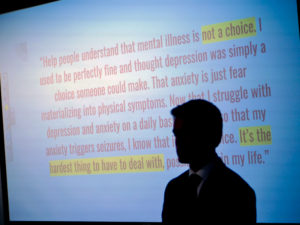Teach the next generation of business leaders the importance of mental health in the workforce. Prepare faculty to engage personally with distressed students. Partner with leading businesses to promote and embrace mental health strategies. These are the elements of the National Mental Health Innovation Center’s (NMHIC) work with the University of Colorado Leeds School of Business. The statistics show why this must be a top priority:
- Each year, one in five American adults struggles with mental illness 1
- One third of adults will face mental illness or addiction within their lifetime²
- The impact is a $300 billion hit on the U.S. economy. And half of that cost is born by business through absenteeism, loss of productivity, employee turnover and disability. ³
Together, NMHIC and the Leeds are shaping the business case for mental health with the next generation of business leaders who are now earning their university degrees. We are creating a model that business schools across the country and around the world can adopt to promote mental health and substance abuse awareness. We’re making the business case for mental health care investment in the workplace.
Courtesy: Jeremy Smolens, CU Leeds School of Business, Class of 2020
Because mental health promotion in the workplace can reduce stigma- which stops many employees from seeking help — the NMHIC and Leeds are teaching, as well as challenging, students to develop solutions.
In the 2017/18 school year, we are expanding our work by:
- Working with Leeds faculty to re-imagine standard business curriculum to teach mental wellness skills as a core part of workforce needs

Leeds student pitches business solutions during Fall 2017 case competition in Boulder, CO (Photo by Patrick Campbell/University of Colorado)
- Providing training to faculty to better equip them to engage with distressed students, whose numbers are growing on campuses across America
- Partnering with Johns Manville, a global manufacturing company based in Denver, that is sponsoring the Leeds undergraduate Case Competition. This required case competition, which allows student teams to work on challenging business scenarios and to present solutions, focuses on mental wellness in the workplace.
During our partnership’s inaugural 2016-17 academic year, we worked directly with students and faculty to:
- Teach 700 business school undergraduates the economic and personal impacts of mental health in the workplace
- Challenge MBA student teams from more than 100 business schools who participated in the premier CU Net Impact Case Competition to develop a best-practice organizational model for mental health
The success and learnings from the first-year work with LEEDS is foundational for potential expansions. Entrepreneurial Solutions, a consulting firm in Boulder, Colorado, contributed to this project by assessing if there is strong interest among other U.S. business schools. There also is potential to expand this kind of embedded learning to other schools within colleges and universities, including Law, Journalism, or even Dentistry.
¹ www.NIMH.nih.gov
² www.NAMI.org
³ www.cdc.gov/mentalhealthsurveillance/fact_sheet.html

